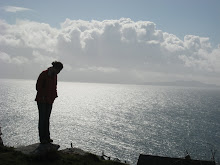I have a confession to make. A teacher confession. As a high school literature teacher, I feel that I am somewhat deficient in the "books that I've read" category. Especially in the "must have read" and "classics" sections. I've never read The Adventures of Tom Sawyer, Death of a Salesman, 1984, or Hamlet. Never read any Dostoevsky or Tolstoy. Every year in my Senior Literature class my kids each select two novels to read and critique. Chances are, I have not read those either. And sometimes this makes me feel like a fraud. Just a little. Maybe.
I think the lack of titles on my lifetime achievement list can be narrowed down to two main factors. One, I read quite slowly. Two, I often prefer non-fiction. The first issue has been with me as long as I remember--it simply takes me a long time to get through a page, and thus, much, much longer to get through a whole book. So, while I read almost every day, the total accumulative difference could be likened to watching grass grow: happening, but hard to see. In college Greg gave me a "teach yourself how to speed read" book. It was meant to be a thoughtful gesture. And that gesture sat on my shelf, eternally untouched.
As for the non-fiction--I love a quirky memoir or a personal essay, a passionate pedagogical philosophy or a quiet reflection on life. Nothing wrong with that. The first time I read David Sedaris' Me Talk Pretty One Day I was studying abroad in France. I laughed and laughed at his English approximations of how he must have sounded trying to cobble together a coherent thought in French (thus, the title of the book). Also while living in France I first read Joan Didion's Slouching Toward Bethlehem. Her personal essays and journalistic pieces touched me, like a soft-spoken friend sitting nearby. Which I so desperately needed at the time, being a little homesick myself. When I moved from California to New York I took comfort in her own description of this same journey. She shared how her newly fashionable dress in San Francisco felt a little dingy and outdated as she stepped off the plane in NYC. It can be intimidating, ya know? Joan knows.
There are so many others, too. But I keep coming back to Virginia Woolf. It saddens me that she must have led a somewhat somber life, she must have felt lost and adrift. Which is strange to me because she's given me so much grounding in my own life at times. I first read A Room of One's Own as a senior in college and I think in some fundamental way this book changed me. Or deeply affected me, at least.
The overarching argument of the book is that historically women have not had the opportunities in life that they deserve, and certainly not the opportunities that men have had. And because of this, their contributions to the world have been stifled and snuffed out before they've ever begun. She lingers for some time on the example of Shakespeare, asserting that if he had had a twin sister with all his same talent and impulse to know the world, she would have either led a very unhappy and traditional life or gone mad while attempting to fulfill her creative destiny. Woolf explains that Shakespeare's sister would not have had the same freedom to travel, to develop illicit relationships, to write, or to explore in general. And thus, her creative angels would have withered or turned rancid inside of her. And then Woolf makes a simple suggestion: every woman needs a room of her own. A room where she can shut the door to her children and her husband and her "womanly duties" and have a moment. A moment to sit, to write, to read, to create, to think, to be, to discover. A moment that is hers.
This metaphor is a powerful one for me. Or maybe it is a symbol, since the room is both the room itself, and representative of a larger idea. Either way, I am always reminded to hold fast to my room. And luckily, I live in a time and a place where that is possible. And fortunately, my husband is the type of man who reminds me to have a room of my own even when I lose sight of it. To go after my dreams. To pursue the unthinkable, the untouchable. To nourish my better angels.
And in this way, I really don't give a damn about a theoretical required reading list. I have my list. And a room of my own.
simple crispy pan pizza
3 days ago



sarah, you do a really good clincher at the end of each post. the only thing i have trouble with when i am wrighting speeches is the chincher.
ReplyDeleteI love reading your writing.
ReplyDeleteSyd, Glad you like the endings. When writing your speeches you can try to create a strong ending by returning to an idea you presented in your opening. Use a little repetition!
ReplyDeleteKaty--thanks. Back atchya.